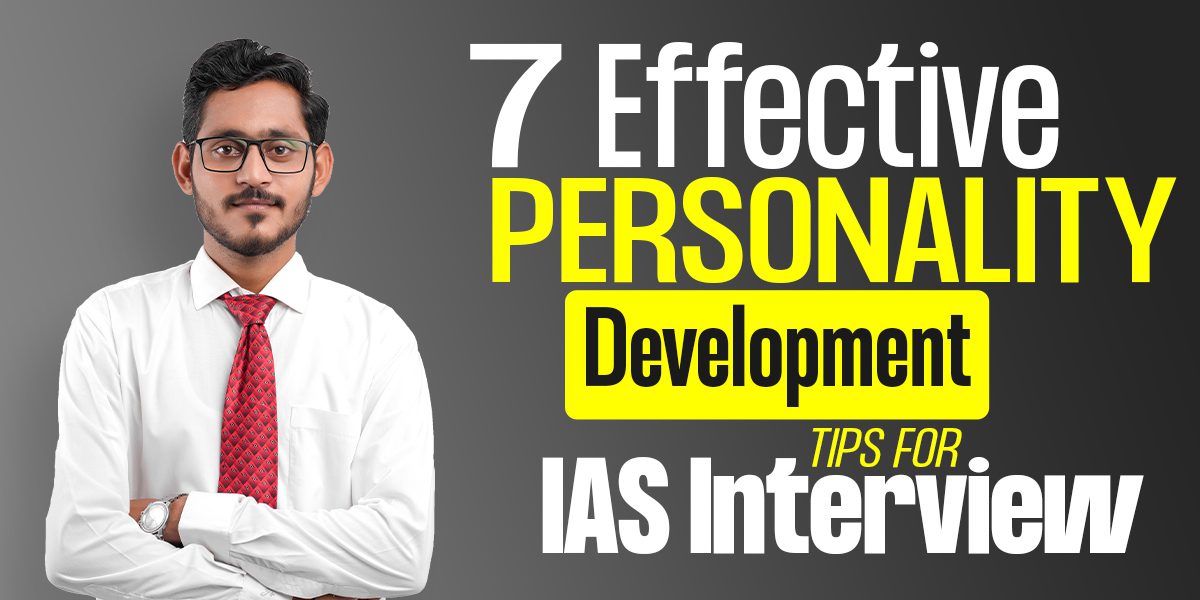
The interview is the final stage of the IAS exam that you need to crack to become an IAS officer. In the IAS interview, your personality holds significant importance. Only being studious and having knowledge about every topic doesn’t make you the perfect candidate. You need to groom your personality because the panellists notice everything about you.
In this article, you will find some of the best personality development tips for IAS interview. Before that, let’s discuss what exactly personality development is and why it is so important.
What is Personality Development?
Personality involves several traits of your inner and outer being. It represents you as a person, including your body language, communication skills, confidence, intellect, appearance, attitude, mood, behavior, etc.
Personality development is the method of developing all the essential traits required for a good personality. It is a way to show your personal skills effectively, self-recognition, and build confidence.
Why is Personality Development Important for IAS?
In the IAS interview, personality plays a crucial role. You have to interact with the panelists confidently and in an energetic manner. They notice everything about your personality and look out for a positive attitude, etiquette, liveliness, intelligence, etc. Without a good personality, you are very likely to be eliminated even if you have good knowledge about the things you studied for the written exams.
Important Tips for Personality Development
- Healthy eye contact
To capture the interest of the board members, you must make healthy eye contact with them. Looking down or at other things shows that you are nervous and lack confidence. By making pleasant eye contact throughout the interview, you can sound confident. While thinking about any answer, you can look at other things. Also, don’t be aggressive with your eyes. Keep your eyes smiling and make contact with all the members depending on who is asking questions.
-
Communication skills
The way you communicate with the panelists makes a huge difference in your selection. In the interview, you need to have good spoken skills so that you can answer properly in an effective manner. This also includes clarity of speech, which means your voice must be clear and understandable.
You should sound confident about whatever you are saying. When you communicate well, you can also represent your answers well. Be humble and gentle and use professional words. Don’t fumble or hesitate while speaking.
-
Body language
Along with words, your body also communicates and the interviewers notice it. The body language starts showing your personality right from the time you enter the room and sit on the chair. You should not look scared or nervous.
You should sit up straight on the chair to show confidence. While answering or listening to the question, you can lean a bit forward to show your interest in the question and create engagement.
Avoid clenching your fists and cutting down your nails with your hands, because these show your nervousness and lack of interest. In addition, touching your face every now is another thing that you must avoid.
-
Smile
A natural smile improves your overall personality and shows that you are confident. Forced smiles are crap that can be seen in your eyes. Before the interview, you must practice how to smile naturally.
Ensure that you don’t overdo it. Smile also shows that you are attentive and listening to what is being said.
-
Avoid crossing legs and arms
This is one of the most common personality traits but easy to learn. It is natural to cross arms and legs while sitting in the interview. You don’t realize when your legs or arms get crossed. But you have to pay attention to it.
Crossing legs and arms are the signs of nervousness and resistance towards the panelists. What you should do is to keep your hands on your lap, and legs open and straight. You can use your hands occasionally for gestures while answering.
-
Listen carefully
Along with being a good speaker, you also need to be a good listener. During the interview, listen carefully to whatever they are saying. Sometimes you may lose yourself in thoughts and get distracted.
-
Other personality development skills
Your dressing sense, leadership skills, positive attitude, empathy, civility, physical health, and grooming are the other important personality development skills that you need to work on for acing the IAS interview.
Wrapping up:
For cracking the IAS interview, you have to realize the importance of personality development and put your efforts accordingly. Using the personality development tips mentioned above, you can prepare yourself effectively for the interview round.
Have any doubts or questions? Feel free to ask using the comments below.
Also read – Things to avoid in IAS Interview
